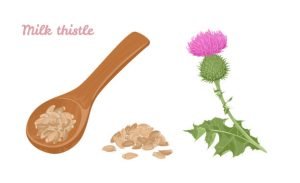Milk thistle, also known as Silybum marianum, is a plant that has been used in traditional Chinese medicine for centuries. It is native to the Mediterranean region but is now grown worldwide.It is commonly used as a herbal supplement and is known for its potential liver-protective properties.
In traditional Chinese medicine, milk thistle is believed to have various medicinal properties and is commonly used to support liver health. It is believed to have hepatoprotective effects, meaning it can help protect the liver from damage caused by toxins or diseases. Milk thistle is also believed to have anti-inflammatory and antioxidant properties.
The active compound in milk thistle is called silymarin, which is a mixture of flavonolignans. Silymarin is believed to be responsible for the plant’s medicinal effects. It is thought to work by increasing the production of liver enzymes that help detoxify the body, reducing inflammation, and protecting liver cells from damage.
Milk thistle is commonly used in traditional Chinese medicine to treat liver diseases such as hepatitis, cirrhosis, and fatty liver. It is also used to support liver function and promote overall liver health. Additionally, milk thistle is sometimes used to treat gallbladder disorders and to support digestion.

It is important to note that while milk thistle is generally considered safe, it may interact with certain medications and can cause mild side effects such as diarrhea, nausea, and abdominal bloating. It is always recommended to consult with a healthcare professional before starting any new herbal supplement, especially if you have any underlying health conditions or are taking medications.
Overall, milk thistle is a popular herb in traditional Chinese medicine for its potential liver-protective properties. However, more research is needed to fully understand its effectiveness and safety.
There have been several studies conducted on milk thistle in humans. These studies have investigated its potential benefits for liver health and various liver conditions.
For example, a systematic review of clinical trials published in 2016 found that milk thistle supplementation may have a positive effect on liver function in patients with liver diseases such as hepatitis B and C, alcoholic liver disease, and non-alcoholic fatty liver disease. However, the review noted that more high-quality studies are needed to confirm these findings.
Another study published in 2012 examined the effects of milk thistle on liver function in patients with chronic liver disease. The study found that milk thistle supplementation improved liver function and reduced liver inflammation in these patients.
Additionally, some studies have suggested that milk thistle may have potential benefits for other health conditions, such as diabetes, cancer, and cardiovascular disease. However, more research is needed to fully understand the effects of milk thistle on these conditions.
It’s important to note that while these studies show promising results, more research is needed to confirm the effectiveness and safety of milk thistle in humans. It is always recommended to consult with a healthcare professional before starting any new herbal supplement or treatment.

Milk thistle is generally considered safe for most people when taken by mouth in appropriate doses. However, like any supplement or medication, it can cause side effects in some individuals. Common side effects of milk thistle may include:
- 1. Upset stomach: Some people may experience gastrointestinal symptoms such as diarrhea, bloating, gas, or indigestion.
- 2. Allergic reactions: Although rare, some individuals may be allergic to milk thistle and may experience symptoms such as rash, itching, swelling, or difficulty breathing.
- 3. Interactions with medications: Milk thistle may interact with certain medications, including anticoagulants (blood thinners), antiplatelet drugs, antidiabetic medications, and some drugs metabolized by the liver. It is important to consult with a healthcare professional before taking milk thistle if you are on any medications.
- 4. Hormonal effects: There is limited evidence suggesting that milk thistle may have estrogenic effects, which could potentially affect hormone-sensitive conditions such as breast cancer or endometriosis. However, more research is needed to fully understand these effects.
It is important to note that milk thistle may not be suitable for everyone, especially those with certain medical conditions or who are pregnant or breastfeeding. It is always recommended to consult with a healthcare professional before starting any new supplement or treatment to ensure it is safe and appropriate for you.
However,the use of milk thistle as a treatment for cancer or any other medical condition has not been approved by the FDA.

